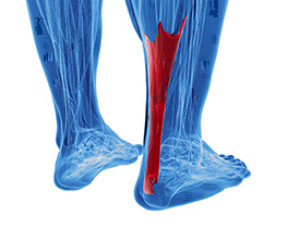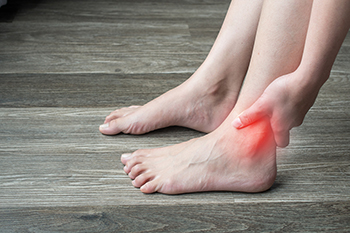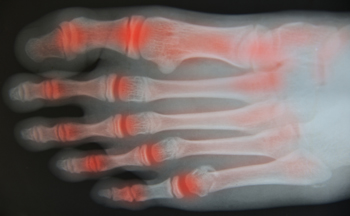Blog
Items filtered by date: April 2022
Can Achilles Tendon Injuries Be Prevented?

There is no mistaking an Achilles tendon injury when it occurs. This large tendon, located at the back of the calf, connects the calf muscles to the heel bone. It is responsible for pointing and flexing the feet, which is necessary in completing daily activities. An injury can happen from increasing running mileage and speed too quickly, which can cause severe pain and discomfort. Patients who have experienced this type of injury find it difficult to walk and are unable to bend their ankle. Mild relief may be found by taking anti-inflammatory medicine, and it may help to stretch the calves. Effective prevention techniques for an Achilles tendon injury includes strengthening the feet and calves as often as possible, which can help to ease the loading force on the tendon. This is accomplished by standing on a step, and lowering the heels one at a time, until a stretch is felt. An Achilles tendon injury often needs immediate attention, and it is strongly suggested that you confer with a podiatrist as quickly as possible who can guide you toward the correct treatment techniques.
Achilles tendon injuries need immediate attention to avoid future complications. If you have any concerns, contact one of our doctors of Kitsap Foot & Ankle Clinic. Our doctors can provide the care you need to keep you pain-free and on your feet.
What Is the Achilles Tendon?
The Achilles tendon is a tendon that connects the lower leg muscles and calf to the heel of the foot. It is the strongest tendon in the human body and is essential for making movement possible. Because this tendon is such an integral part of the body, any injuries to it can create immense difficulties and should immediately be presented to a doctor.
What Are the Symptoms of an Achilles Tendon Injury?
There are various types of injuries that can affect the Achilles tendon. The two most common injuries are Achilles tendinitis and ruptures of the tendon.
Achilles Tendinitis Symptoms
- Inflammation
- Dull to severe pain
- Increased blood flow to the tendon
- Thickening of the tendon
Rupture Symptoms
- Extreme pain and swelling in the foot
- Total immobility
Treatment and Prevention
Achilles tendon injuries are diagnosed by a thorough physical evaluation, which can include an MRI. Treatment involves rest, physical therapy, and in some cases, surgery. However, various preventative measures can be taken to avoid these injuries, such as:
- Thorough stretching of the tendon before and after exercise
- Strengthening exercises like calf raises, squats, leg curls, leg extensions, leg raises, lunges, and leg presses
If you have any questions please feel free to contact one of our offices located in Bremerton and Port Orchard, WA . We offer the newest diagnostic tools and technology to treat your foot and ankle needs.
It's Time for Beautiful Feet
Why Is My Ankle in Pain?
Ankle pain may also be caused by various forms of arthritis within the ankle joint, such as osteoarthritis, gout, rheumatoid arthritis, Reiter syndrome, or even septic arthritis — which is caused by a bacterial or fungal infection. Ankle sprains are one of the most common sources of ankle pain. They occur when the ligaments that bind and support the ankle bones become stretched beyond their limit or even tear. Tarsal tunnel syndrome occurs when the tibial nerve — within the tarsal tunnel on the inside of the ankle — becomes compressed. Ankle tendonitis can occur when a tendon that connect muscles to bones in the ankle becomes irritated, swollen, and painful. Even poor circulation can lead to pain and discoloration in the feet and ankles. No matter the cause of your ankle pain, it is suggested that you contact a podiatrist to have your condition diagnosed properly and treated accordingly.
Ankle pain can be caused by a number of problems and may be potentially serious. If you have ankle pain, consult with one of our doctors from Kitsap Foot & Ankle Clinic. Our doctors will assess your condition and provide you with quality foot and ankle treatment.
Ankle pain is any condition that causes pain in the ankle. Due to the fact that the ankle consists of tendons, muscles, bones, and ligaments, ankle pain can come from a number of different conditions.
Causes
The most common causes of ankle pain include:
- Types of arthritis (rheumatoid, osteoarthritis, and gout)
- Ankle sprains
- Broken ankles
- Achilles tendonitis
- Achilles tendon rupture
- Stress fractures
- Bursitis
- Tarsal tunnel syndrome
- Plantar fasciitis
Symptoms
Symptoms of ankle injury vary based upon the condition. Pain may include general pain and discomfort, swelling, aching, redness, bruising, burning or stabbing sensations, and/or loss of sensation.
Diagnosis
Due to the wide variety of potential causes of ankle pain, podiatrists will utilize a number of different methods to properly diagnose ankle pain. This can include asking for personal and family medical histories and of any recent injuries. Further diagnosis may include sensation tests, a physical examination, and potentially x-rays or other imaging tests.
Treatment
Just as the range of causes varies widely, so do treatments. Some more common treatments are rest, ice packs, keeping pressure off the foot, orthotics and braces, medication for inflammation and pain, and surgery.
If you have any questions, please feel free to contact one of our offices located in Bremerton and Port Orchard, WA . We offer the newest diagnostic and treatment technologies for all your foot care needs.
How to Deal With Arthritic Foot Pain
Arthritis, a painful inflammatory condition, can affect many parts of the body including the feet, particularly as you age. Arthritic foot pain often comes with stiff joints, as well as a loss of strength, flexibility, and mobility in the affected area. Various things can be done to relieve pain and slow the progression of this disease, including foot massages to improve circulation and decrease tension in the joint, using heat (to loosen the muscles and reduce stiffness), or using ice (to constrict blood vessels and reduce blood flow to the problem area). Wearing proper footwear (wide enough to accommodate orthotics or other foot aids and with proper arch support to stabilize the joints and feet) and continuing to move despite the pain may also help. Other suggestions include maintaining a healthy body weight, participating in physical therapy, using non-steroidal anti-inflammatory medications, topical creams, and;/or steroid injections. While there is no cure for arthritis, a podiatrist can help determine the best way to handle your arthritic foot pain.
Arthritis can be a difficult condition to live with. If you are seeking treatment, contact one of our doctors from Kitsap Foot & Ankle Clinic. Our doctors can provide the care you need to keep you pain-free and on your feet.
Arthritic Foot Care
Arthritis is a joint disorder that involves the inflammation of different joints in your body, such as those in your feet. Arthritis is often caused by a degenerative joint disease and causes mild to severe pain in all affected areas. In addition to this, swelling and stiffness in the affected joints can also be a common symptom of arthritis.
In many cases, wearing ill-fitting shoes can worsen the effects and pain of arthritis. Wearing shoes that have a lower heel and extra room can help your feet feel more comfortable. In cases of rheumatoid arthritis, the arch in your foot may become problematic. Buying shoes with proper arch support that contour to your feet can help immensely.
Alleviating Arthritic Pain
- Exercises that stretch the foot can prevent further pain and injury and increase mobility
- Most of the pain can be alleviated with anti-inflammatory drugs, heat, and topical medications
- Massages can help temporarily alleviate pain.
It is best to see your doctor for the treatment that is right for your needs and symptoms. Conditions vary, and a podiatrist can help you determine the right method of care for your feet.
If you have any questions, please feel free to contact one of our offices located in Bremerton and Port Orchard, WA . We offer the newest diagnostic tools and technology to treat your foot and ankle needs.



